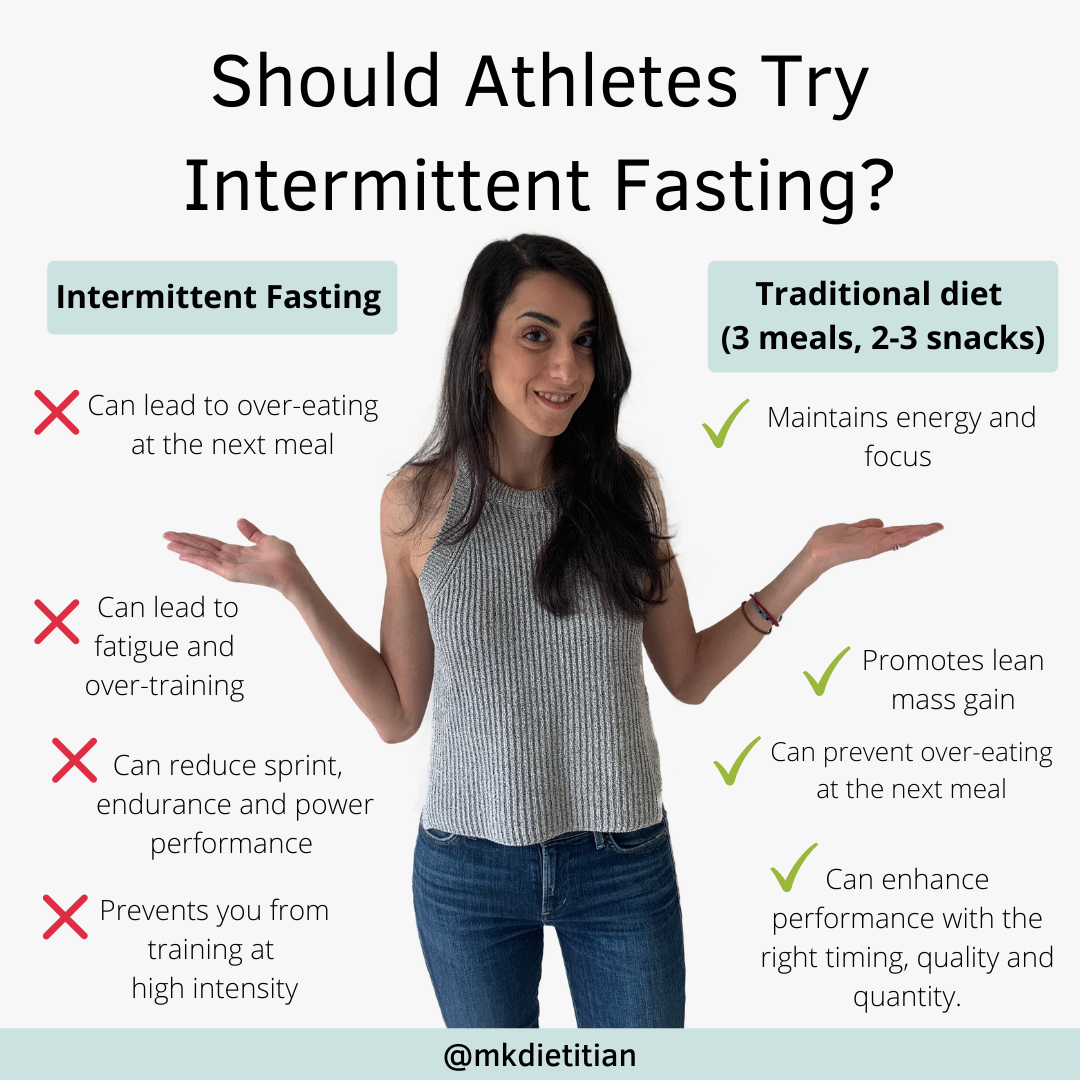Should Athletes Be Intermittent Fasting?
“Should I try Intermittent Fasting?” Athletes and active clients ask me this question several times per month. Let’s have look at what the science actually says about this popular diet trend.
What Is Intermittent Fasting anyway?
Intermittent fasting has gained popularity in the last few years promising weight loss, improved metabolism and reduced disease risk like diabetes and heart disease. Different types of Intermittent fasting exist, such as “Alternate Day Fasting” which involves alternating days of fasting with days of “normal” eating, or Ramadan fasting which is a religious fast involving fasting from fluids and food from sunrise to sunset during the month of Ramadan.
This article will focus on the most common type of Intermittent Fasting, called “Time Restricted Feeding” which involves fasting for most of the day anywhere between 16-20 hours, and allowing intake of food for the remaining hours of the day (4-8 hours). For e.g. if you’re doing a “16 on/8 off fast” and your dinner was at 8pm the night before, then you can only eat between 12pm-8pm the next day, and all your meals and snacks will have to fit in that 8h window. Usually that means skipping breakfast, having 2 meals and 1-2 snacks. The smaller the eating window, the longer you’ll have to go without eating.
What is the impact of Intermittent fasting on athletic performance?
Traditional sport nutrition recommendations encourage athletes to eat regularly (every 2-4h), surround training with good pre and post workout fuel and hydration, eat upon waking and even add a pre-bed snack if needed. All of these recommendations have years of research that demonstrate enhanced performance, muscle recovery and delayed fatigue during exercise.
Intermittent fasting promotes somewhat the opposite of traditional sport nutrition recommendations: restricting eating at certain times of the day which can fall during training hours. It also involves skipping breakfast and promotes long hours without fuelling.
Here’s what the research shows when it comes to intermittent fasting (particularly, “time restricted feeding”) and sport performance:
Studies show varied results when it comes to power, endurance and sprint performances in athletes with some studies showing a decreased performance and other showing no difference. No study however has shown improved performance on this diet (1, 2, 3).
Skipping breakfast has been shown to slow down rowers during a 2,000 m race trial and reduce performance of cyclists during cycling tests that took place in the evening, after the athletes were fed (4,5). Athletes weren’t particularly following an “intermittent fast” in these studies however they followed an overnight fast, skipped breakfast and ate lunch which mimics the time restricted feeding protocol.
When it comes to body composition changes, studies show that intermittent fasting leads to weight loss and fat mass loss (6, 7, 8), however this is expected since overall calories are reduced. Remember, if physique change is a goal of yours, it can still be reached with a traditional diet that fuels your body and your training. Research shows that intermittent fasting is not superior to the traditional calorie restriction diet when it comes to weight loss and body composition changes (6, 7).
Bottom Line, Can I Try this diet?
I usually discourage this diet for athletes and active individuals as I find the risks outweigh the benefits. Sure, you can play around with the timing of your meals and training so that you’re training while fed, however the nature of the diet makes it difficult to sustain longterm. It interferes with social events around eating which can add stress, as you can only eat at certain times. In addition, the diet promotes long hours without eating which can lead to fatigue, overtraining as well as nutrient deficiencies. Finally, athletes who have tried intermittent fasting tend to overeat later on in the day.
Always keep in mind that there is no one size fits all when it comes to diet and nutrition. It’s important to choose the eating pattern that allows you to feel and perform at the best of your ability. Even if you strongly believe in intermittent fasting, it’s always best to work with a Registered Dietitian to minimize potential negative impacts on performance and quality of training. A successful diet is one you can implement easily into your routine, follow consistently, and that works best for you. However, before you embark on the next diet trend, ask yourself: “Can I maintain this diet pattern for the rest of my life and will it help me achieve my goals longterm?”.
References
Levy E, Chu T. Intermittent Fasting and Its Effect on Athletic Performance: A review. Current Sports Medicine Reports. 2019;18(7):266-269.
Aird TP, Davies RW, Carson BP. Effects of fasted vs fed-state exercise on performance and post-exercise metabolism: A systematic review and meta-analysis. Scand J Med Sci Sports. 2018;28:1476–1493.
Zouhal H, Saeidi A, Salhi A, Li H, Essop MF, Laher I, Rhibi F, Shalamzari SA, Abderrahman AB. Exercise Training and Fasting: Current Insights. Journal of Sports Medicine 2020; 11:1–28.
Clayton, D.J., Barutcu A., Machin C., Stensel D.J., James L.J. Effect of Breakfast Omission on Energy Intake and Evening Exercise Performance. Medicine & Science in Sports & Exercise. 2015;47(12):2645–2652.
Elizabeth C., & Richard M. Omission of carbohydrate-rich breakfast impairs evening 2000-m rowing time trial performance. European Journal of Sport Science. 2019; 19:1, 133-140. DOI: 10.1080/17461391.2018.1545052
Aragon, A.A., Schoenfeld, B.J., Wildman, R. et al. International society of sports nutrition position stand: diets and body composition. J Int Soc Sports Nutr. 2017; 14, 16. https://doi.org/10.1186/s12970-017-0174-y.
Freire R. Scientific evidence of diets for weight loss: Different macronutrient composition, intermittent fasting, and popular diets. Nutrition 69 (2020) 110549. https://doi.org/10.1016/j.nut.2019.07.001.
Moro T, Tinsley G, Bianco A, Marcolin G, Pacelli QF, Battaglia G, Palma A, Gentil P, Neri M, Paoli A. Effects of eight weeks of time‑restricted feeding (16/8) on basal metabolism, maximal strength, body composition, inflammation, and cardiovascular risk factors in resistance‑trained males. Transl Med. 2016;14:290. https://doi.org/10.1186/s12967-016-1044-0.

